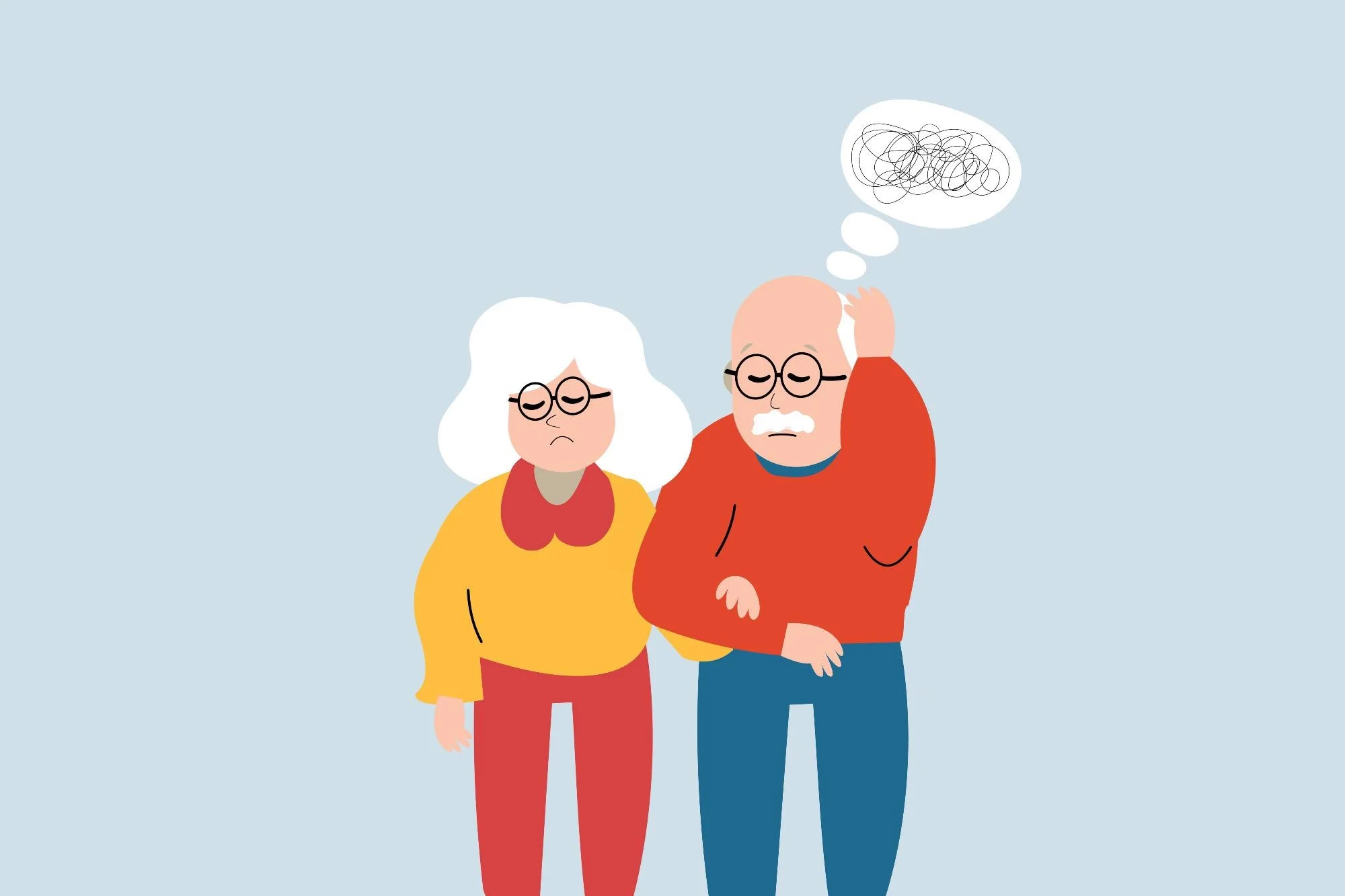

Dementia is a term used to describe a group of symptoms affecting memory, thinking and social abilities severely enough to interfere with daily life.
Usually occurs in the elderly, progressive impairment of intellectual function, especially short term memory.
SYMPTOMS OF DEMENTIA : -
COGNITIVE CHANGES
PSYCHOLOGICAL CHANGES
CAUSES : Dementia is caused by damage to or loss of nerve cells and their connections in the brain. Depending on the area of the brain that's damaged, it affects every person in different Way.
PARENCHYMATOUS BRAIN DISEASE
TYPES
ALZHEIMER'S DISEASE:
Most common cause of dementia.
Women's predominate, due to cerebral atrophy.
Alzheimer's disease patients have plaques and tangles in their brains. Plaques are clumps of a protein called beta-amyloid, and tangles are fibrous tangles made up of tau protein. It's thought that these clumps damage healthy neurons and the fibers connecting them.
VASCULAR DEMENTIA Dementia is caused by damage to the vessels that supply blood to your brain. Blood vessel problems can cause strokes or affect the brain in other ways, such as by damaging the fibers in the white matter of the brain.
The most common signs of vascular dementia include difficulties with problem-solving, slowed thinking, and loss of focus and organization. These tend to be more noticeable than memory loss.
LEWY BODY DEMENTIA. Abnormal balloon like clumps of protein that have been found in the brains of people with Lewy body dementia,
ALZHEIMER'S DISEASE AND PARKINSON'S DISEASE. This is one of the more common types of progressive dementia.
FRONTOTEMPORAL DEMENTIA. This is a group of diseases characterized by the breakdown of nerve cells and their connections in the frontal and temporal lobes of the brain. These are the areas generally associated with personality, behavior and language. Common symptoms affect behavior, personality, thinking, judgment, and language and movement.
Mixed dementia.
RISK FACTORS
Age. The risk rises as you age, especially after age 65.
Family history. Having a family history of dementia
Down syndrome. Down syndrome develops early-onset Alzheimer's disease.
PREVENTION
DIAGNOSIS
Imaging tests - Ct scan, MRI, PET scan.
EEG
Basic investigations: Complete blood count, urinalysis, blood glucose, serum electrolytes, renal function tests, thyroid function tests, serum B12, and folate levels, serological tests for syphilis, arterial Po2 and pco2, X-ray skull, EEG, lumbar puncture, CT scan/MRI scan of brain, neuropsychological tests, and drug screens.
HOMEOPATHIC MANAGEMENT
ANACARDIUM ORIENTALE: Sudden loss of memory due to physical and mental lack of power. Suddenly forgets names, those around her and what she has seen. Bad memory. Absent minded. Lack of confidence in himself or others. Senile dementia, especially in Alzheimer’s disease. Brain fatigue. Fear of examination in students.
AMBRA GRESIA: The memory is impaired, slow comprehension. Senile dementia. Cannot understand what one read and have trouble with calculations-even simple mathematics. Intensely shy, timid, blushes easily.
ASHWAGANDHA: Loss of memory, in total or partial destruction of intellect. Power of thinking, memory and expression is paralyzed. Students who cannot fix their attention on any subject nor can memorize their lesson, nor express what they have read.
BACOPA MONNIERI: A specific remedy for dementia. It is mostly used a tonic for absent-mindedness and short of memory. Sharpens dull memory.
BARYTA CARBONICUM: Loss of memory, mental weakness. Forget the words that he is about to speak. Forgetfulness while speaking and the mind seems clouded. Senile dementia. Increasing mental weakness in old people. Dementia in old people after a stroke. Absent mindedness in old people.
CANNABIS INDICA: Very absent –minded, forgetful, cannot finish a sentence. Sudden loss of speech, begins a sentence bur cannot finish it. He or she forgets the words in between a conversation and does not remember what he or she is about to say.
GINKGO BILOBA: Ginkgo biloba mother tincture is effective for memory loss, especially in old people. It increases the circulation of blood to head.
LAC CANNINUM: Very forgetful in writing. Cannot remember the right words when writing and makes frequent mistakes. Cannot concentrate while studying or anything. Absent minded with a feeble memory and forgetfulness. Makes purchase and goes home without picking them up. Goes to post a letter and comes back with the letter in his pocket.
HELLEBORUS NIGER: Apathy, dullness, stupid, slowness and blankness of mind. Poor memory following a stroke. Inattention. Poor concentration. Slow in answering.
KALI BROMATUM: Loss of memory, forgets how to talk, has to be told the word before he can speak it. Senile softening of the brain. Amnesic aphasia. Memory weakness from grief and anxiety. Slow, hesitates, omits, or mixes up words in talking and writing. Fidgety, busy hands, fumbles. Moves arms about wildly.
KALI PHOSPHORICUM: A brain tonic. Weak memory because of mental exertion. Both mental and physical exhaustion. Slightest labor seems a heavy task. Indisposition to meet people. Anxiety with nervous dread. Depressed and gloomy.
LYCOPODIUM CLAVATUM: Weak memory, confused thoughts. Dyslexia. Spells or writes wrong words and syllables. Cannot read what he writes. Weakness of memory after influenza.
MEDORRHINUM: Weak memory. Poor concentration. Loses the thread of concentration. Forgets names and words. Forgetting the names of friends and familiar people. The patient may not even remember their own names. Forgetfulness while writing, both regarding the words that are to be written as well as their spelling.
NUX MOSCHATA: Confused mind and impaired memory. Dreamy and bewildered, as in a dream. Sudden loss of thoughts. Absent –minded and dreamy. Thoughts suddenly vanish, while talking, reading of writing. Using wrong words, especially during headaches. Vague or space-out as if intoxicated. Clairvoyant states. Changeable moods, laughing and crying.
PHOSPHORIC ACID: Impaired memory. Weak memory. Apathetic. Indifferent to everything. Aversion to talking. Cannot collect his thoughts or find the right word. Difficult comprehension. Effects of grief and mental shock.